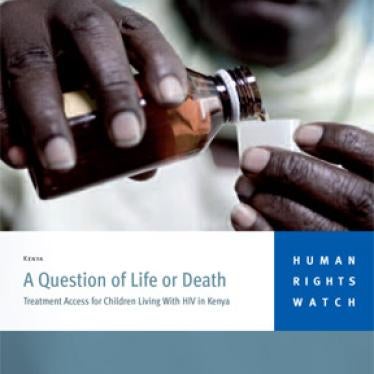20-month-old Daniel is sitting on his grandmother’s lap in a small house in Nyangoma village, Western Kenya. His body is periodically shaken by a violent cough, and he looks tired and weak.
Daniel (not his real name) is HIV-positive and suspected to have tuberculosis, the leading cause of death for people living with HIV.
But the district hospital where he can get a TB test and the necessary care is 10 kilometres away, and his grandmother cannot afford the fare. In Africa, about half of all children born with HIV die before their second birthday. On which side of the statistics will Daniel be?
Located in the region of the world that has been hit the hardest by the AIDS epidemic — southern and eastern Africa — Kenya made antiretroviral treatment for AIDS free of charge in 2006, and has been lauded for its prevention measures.
Yet research that Human Rights Watch conducted there last year shows that the government is not doing nearly enough to treat HIV-positive children, the most vulnerable patients.
By the government’s own optimistic figures, only about 20,000 of the at least 60,000 children who urgently need anti-retroviral treatment are actually getting it, which means that fewer than one in three children who are seriously ill are getting the treatment they need to save their lives.
For years, the government and its international donors focused on getting the drugs to adults. In fact, donor money provides more for the fight against HIV in Kenya than the Kenyan government itself, which only allocates about seven per cent of government expenditure for health care.
Many local health centres do not offer HIV treatment for children, even when they do for adults. Many of these centres do not test children and staff are often not trained in pediatric HIV treatment.
Frequently children do not even turn up in the statistics; a recent landmark survey on HIV in Kenya, the Kenya AIDS Indicator Survey, excluded data regarding children up to age 15.
The recent food crisis in East Africa has added another complication. In Nairobi’s Mathare slum, I met a listless 10-year-old girl, her eyes half closed, leaning against the aunt who tries to care for her.
The aunt described how she had to stop giving her niece drugs because she had so little food. Unless the drugs are taken with food, they can cause severe reactions, and the girl had fallen violently ill.
Not having enough food is a typical problem for people in this slum, who live in shacks without plumbing or electricity, on the edge of starvation.
Children who are infected with both HIV and tuberculosis face particular problems. There is no reliable TB test for children, and the current TB drugs cannot be taken together with antiretroviral treatment.
If Daniel’s grandmother can find the money to go to the district hospital and the boy is found to have tuberculosis, he will need to get treated for this first before he starts anti-retroviral drugs - if he can survive until his TB is cured.
Both Kenya and international donors, including the UK, must do much more for children suffering from HIV.
Antiretroviral drugs for children should be made available in health facilities at the local level, and health care personnel should be specifically trained to treat children living with HIV.
The new policy for expanding access to HIV testing of infants needs to be carried out. In addition, the government needs to do more to reach children whose parents or caregivers do not take them for treatment.
This should be done through strengthened, well-funded child protection measures and networks of community health workers. Kenya should also allocate 15 per cent of the national budget to health, as it committed to do in the Abuja Declaration, along with other African governments.
The substantial international donor support for Kenya must be used to bolster child health policies financially and technically, and to strengthen the capacity of the health system as a whole.
International donors should also fund research on new, more effective, tuberculosis drugs that can be taken together with antiretroviral drugs, and on a test that can accurately diagnose tuberculosis in children.
Then, it might not be too late for Daniel.







